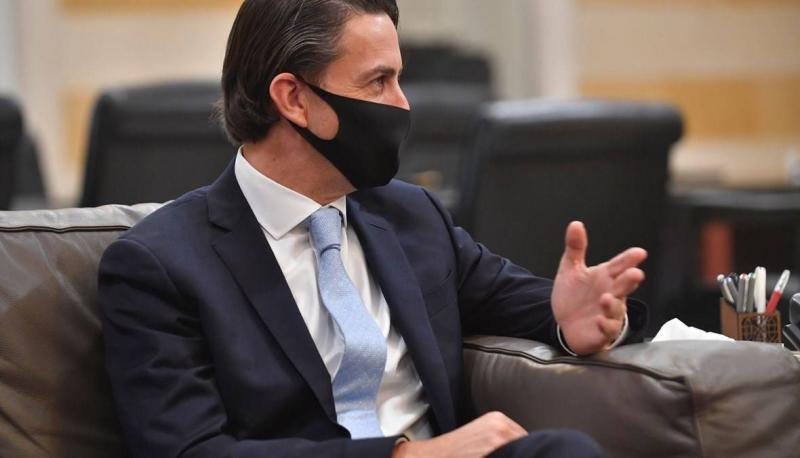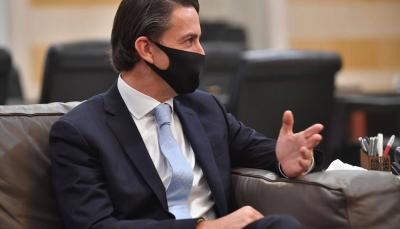Lebanon is still waiting for the Israeli response to the recent Lebanese proposals conveyed by the American envoy to the delimitation negotiations, Amos Hochstein, to build on in the upcoming phase. Despite the negative repercussions left by the three drones sent to the exclusive economic zone of occupied Palestine, American efforts remain ongoing in an attempt to bridge the differences, reaffirming previous commitments since the "framework agreement" was established between the American administration and Lebanon, where both recorded their pledges to facilitate negotiations leading to the delimitation process.
Moving beyond the series of scenarios that accompanied the launch of the drones, informed diplomatic sources indicated via "Al-Markazia" that it can be said that the communications following the operation and the content of the statement issued by the government last Monday succeeded in mitigating the negative repercussions that they left behind. It is now possible for Lebanon to establish a narrative of the government's “innocence” regarding such operations if they occurred outside the political and diplomatic context and its prior commitments.
Accordingly, Lebanon's commitments to the American intermediary facilitating his mission following the arrival of the "Energin Power" ship at the "Karish Field" still stand, within the complete conditions that define the rights and obligations of the various parties. The bet has and will remain on the American role to secure a positive Israeli response that recognizes Lebanon's full rights in the exclusive economic zone. Ignoring both the American and Israeli sides' acknowledgment of Lebanon's significant retreat from what was proposed on the table in Naqoura negotiations is not timely; the Lebanese side has touched upon all red lines, and there can be no step back from the line it proposed to amend the boundary and keep it straight in the area extending from the "Karish Field's meandering gap" through blocks 9 and 8 towards point 23 at the triangle of the Lebanese exclusive economic zones between Lebanon, Cyprus, and Israel.
On this basis, diplomatic references are building more than one scenario for the upcoming phase and are betting on receiving the Israeli response between July 20 and the end of the current month, aligning with the outcomes of President Joe Biden's visit to Israel and the Palestinian Authority, as well as the unprecedented visit to Riyadh and the American-Arab-Gulf summit, which will discuss everything surrounding the global energy file. Hochstein could then form the final formula for a set of combined and shared proposals to be presented to the parties of Lebanon and Israel. This can only be achieved once he has gathered complete information from both the Lebanese and Israeli positions. The energy file has become a major factor in the ongoing negotiations in many areas witnessing disputes over oil and gas fields, especially following the sanctions imposed on Russia and the world's need to compensate for the shortages occurring in global markets.
In light of this information, one of the scenarios bets on the expected American decisiveness in the file, as its need for Eastern Mediterranean oil to secure it for its European allies as quickly as possible and at minimal cost in safe conditions will make Washington more realistic in dealing with Lebanon's demands, which it will have to respond to. This cannot be completed without ensuring full Israeli approval and providing final guarantees to close the file so that both can focus on their operations for exploration and extraction in their respective areas without considering the other region and its resources.
If one of the references delves into details, they believe that what was erased by "Hochstein's meandering line" from Lebanese blocks 9 and 8 holds no commercial value, and Israel cannot reach that area at all should it seek to claim its resources after annexing it to its share. It is in the interest of both parties to arrange the line between Lebanese block 10 and Israeli block 72, reaching the meandering point opposite the "Qana Field," where a dispute may arise over what riches may exist in that spot if it is confirmed that the field is rich in resources similar to those found in Karish.
Based on all this information, diplomatic observers pause at the flood of information sent by the Israeli side regarding the size of the Lebanese guarantees that Hochstein brought from Beirut concerning Lebanon's retention of the full rights to Karish without referencing its final position on the other points surrounding the negotiations. This is something that cannot be undermined in importance when reading the Israeli strategy applied in addressing all parties, including within Israel, to assure them of distancing all scenarios that speak of war in the region while guaranteeing a happy ending to its initiative.
Once these two messages have reached, Lebanon will remain waiting for the third message that concerns it when it demands reviving negotiations. This waiting period may not be long if it remains expected at the end of July, after which the process for delineating the newly agreed-upon line among all parties can commence. At that point, knowledgeable sources conclude, there may be no need to return to the indirect Naqoura negotiations if an agreement is reached on the line that will be delineated according to standards and coordinates that there will be no discussion about once the American mediator completes his mission. It may then be translated through a delegation or technical team either in Naqoura or at the United Nations, where the parties can formally recognize the final boundaries between the two states.




